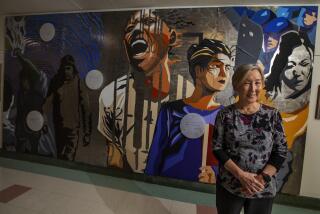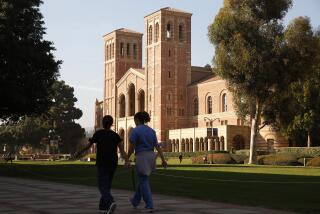Debate at Cal State L.A. over ethnic studies requirement heats up
A debate at Cal State L.A. over an ethnic studies requirement turned heated Tuesday as several students tried to shout down faculty members who responded by chanting “Let her speak, let her speak.”
Dozens of students crowded into a meeting of the Academic Senate, which was considering a motion that at least one of two required general education diversity classes be in Asian/Asian American studies, Chicano studies, Latin American studies or Pan-African studies, or in related courses in some other departments.
The 55-member senate had rejected a similar requirement last month but had been considering a new motion amid pleas by many students that mandated curriculum should include perspectives from all cultures.
Many ethnic studies instructors who support the requirement argue they have particular expertise in theories and instruction that can’t be replicated in other departments.
Opponents argued that although they valued the study of race and ethnicity, such studies should be integrated throughout the curriculum, allowing students a greater choice in classes.
After frequent interruptions of one faculty presenter, several others began chanting “Let her speak,” with student chanters countering “Ethnic studies, ethnic studies.”
After nearly two hours, the meeting was adjourned with no vote.
Steven Urrutia, a political science major who spoke in support of the requirement, said he was disappointed.
“It seemed like faculty had already made up their minds,” said Urrutia, 21, who is vice president of student government. “It seemed like there was a lot of animosity over something as simple as giving us more education.”
Student and faculty supporters got a boost earlier in the day when the Los Angeles City Council approved by a vote of 14 to 0 a resolution supporting the ethnic studies requirement.
Councilman Gilbert Cedillo, who presented the resolution, said in an interview that greater education on race and ethnicity might help to ease conflict on wider issues facing the city.
“We live in one of the most diverse cities in the world, and people have to have sensitivity to each other and value each other; and ethnic studies contributes to that,” Cedillo said.
carla.rivera@latimes.com
Twitter:CarlaRiveralat
More to Read
Start your day right
Sign up for Essential California for news, features and recommendations from the L.A. Times and beyond in your inbox six days a week.
You may occasionally receive promotional content from the Los Angeles Times.







